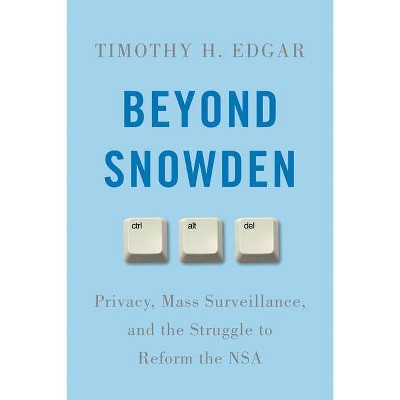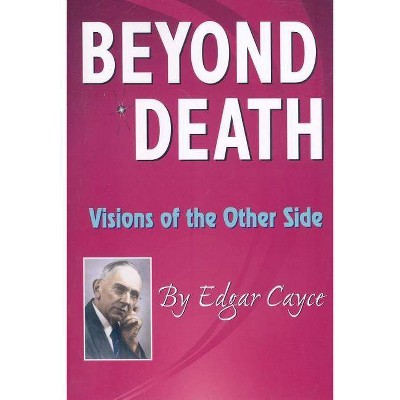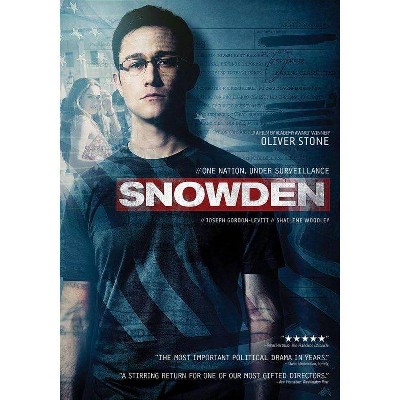Beyond Snowden - by Timothy H Edgar (Hardcover)

Similar Products
Products of same category from the store
AllProduct info
<p/><br></br><p><b> Book Synopsis </b></p></br></br><p><i>Safeguarding Our Privacy and Our Values in an Age of Mass Surveillance</i></p><p>America's mass surveillance programs, once secret, can no longer be ignored. While Edward Snowden began the process in 2013 with his leaks of top secret documents, the Obama administration's own reforms have also helped bring the National Security Agency and its programs of signals intelligence collection out of the shadows. The real question is: What should we do about mass surveillance?</p><p>Timothy Edgar, a long-time civil liberties activist who worked inside the intelligence community for six years during the Bush and Obama administrations, believes that the NSA's programs are profound threat to the privacy of everyone in the world. At the same time, he argues that mass surveillance programs can be made consistent with democratic values, if we make the hard choices needed to bring transparency, accountability, privacy, and human rights protections into complex programs of intelligence collection. Although the NSA and other agencies already comply with rules intended to prevent them from spying on Americans, Edgar argues that the rules--most of which date from the 1970s--are inadequate for this century. Reforms adopted during the Obama administration are a good first step but, in his view, do not go nearly far enough.</p><p>Edgar argues that our communications today--and the national security threats we face--are both global and digital. In the twenty first century, the only way to protect our privacy as Americans is to do a better job of protecting everyone's privacy. <i>Beyond Surveillance: Privacy, Mass Surveillance, and the Struggle to Reform the NSA</i> explains both why and how we can do this, without sacrificing the vital intelligence capabilities we need to keep ourselves and our allies safe. If we do, we set a positive example for other nations that must confront challenges like terrorism while preserving human rights. The United States already leads the world in mass surveillance. It can lead the world in mass surveillance reform.</p><p/><br></br><p><b> From the Back Cover </b></p></br></br><p>Unmasking incidental collection prism downstream collection</p><p>The language of America's mass surveillance programs, once obscure and hidden behind veils of secrecy, is now part of the daily reporting about Russian hacking of America's 2016 presidential election. Edward Snowden began to illuminate the machinery of surveillance in 2013 with his leaks of top-secret documents, but it was the Obama administration's own reforms that helped bring the National Security Agency and its programs of intelligence collection out of the shadows.</p><p>In <i>Beyond Snowden</i>, Timothy Edgar--whose career in government coincided with Snowden's tenure--grapples with many of the issues that consumed the former NSA contractor now in exile in Moscow. Edgar's book takes us on a journey through America's surveillance state to find the answer to this central question: What should we do about mass surveillance?</p> <p>Edgar is a long-time civil liberties activist who worked inside the intelligence community for six years during the Bush and Obama administrations. He believes that the NSA's programs are a profound threat to the privacy of everyone in the world. At the same time, he argues that mass surveillance programs can be made consistent with democratic values--if we make the hard choices needed to bring transparency, accountability, privacy, and human rights protections into complex programs of intelligence collection. Although the NSA and other agencies already comply with rules intended to prevent them from spying on Americans, Edgar argues that these rules--most of which date from the 1970s--are inadequate for this century. Reforms adopted during the Obama administration after the Snowden revelations are a good first step, in his view, do not go nearly far enough.</p><p>Edgar notes that our communications today--and the national security threats we face--are both global and digital. <i>Beyond Snowden</i> explains both why and how we can protect our privacy, without sacrificing the vital intelligence capabilities we need to preserve our safety and that of our allies. If we do, we set a positive example for other nations that must confront challenges such as terrorism while preserving human rights. The United States already leads the world in mass surveillance. It can lead the world in mass surveillance reform.</p><p/><br></br><p><b> Review Quotes </b></p></br></br><br><p>"An expert--and laser-focused--discussion of electronic intelligence-gathering in the aftermath of an epic security breach."--<i>Washington Independent Review of Books</i></p><br><br><p><i>Beyond Snowden</i> helps the reader understand the debates between the national security lobby and the civil liberties lobby, and make some constructive suggestions about how to bridge the divide.--Hannah Kuchler, <i>Financial Times</i></p><br><br><p>Many books discuss privacy and surveillance policies, how policies are made, and how they should be improved, but this book discusses them from the inside. The author provides anecdotal stories of how his positions have influenced and changed privacy policy, leading to more disclosure of what the government collects and for what purposes. . . . By discussing how the intelligence gathering agencies and the FISA court work, the author interweaves historical items with personal intelligence and anecdotes for a compelling read. Recommended.--<i>CHOICE</i></p><br><br>A former civil rights lawyer considers changing attitudes regarding personal privacy within the National Security Agency following the disclosures by Edward Snowden. Formerly a lawyer for the American Civil Liberties Union and then a civil liberties protection officer for the Director of National Intelligence and the Obama White House, Edgar (International and Public Affairs/Brown Univ.) is well-versed in, and sympathetic to, the concerns of both civil liberties advocates and the national security establishment.--<i>Kirkus Reviews</i><br><br>Although <i>Beyond Snowden</i> is modest in length, it is dense with detail and unavoidably complex legal reasoning, particularly in discussing the distinction between NSA treatment of foreign and American communications. Edgar has documented his sources carefully and does his best to present a complicated subject in a clear and succinct manner...This is an important book from a uniquely informed source on a critical and timely topic. It deserves widespread attention.--<i>Foreword Review</i><br><br>Edgar, a former ACLU lawyer who left that group in 2006 to advise the director of national intelligence on safeguarding civil liberties and privacy, has the appropriate background to provide this deep dive into the recent history of the American intelligence community's adoption of mass-surveillance techniques and the ensuing efforts to balance security and freedom. While the general public is familiar with the contours of the issues and the revelations that Edward Snowden provided, Edgar provides an insider's perspective on the government's internal debates.--<i>Publisher's Weekly</i><br><br>Amid the white heat of our national debate over surveillance, Timothy Edgar provides an insightful perspective that few Americans have had. He is the outsider who defended privacy while working for the American Civil Liberties Union, and also the insider who became a senior White House adviser. In <i>Beyond Snowden</i>, he shows Americans how we can strike the fair balance between privacy and security that we all seek.--Stephen Kinzer, Senior Fellow, Watson Institute, Brown University, and author of <i>The Brothers: John Foster Dulles, Allen Dulles, and Their Secret World War</i><br><br>Part confessional, part call to action, Edgar's book provides a unique and thoughtful insider's account of his years inside the expanding U.S. surveillance system. It's a must-read for the new U.S. administration's national security team, their overseas counterparts, and anyone who wants to learn critical lessons from the mistakes of the immediate post-9/11 era.--Siobhan Gorman, former intelligence reporter, <i>Wall Street Journal</i><br><br>The privacy-security debate is not about the forces of darkness vs. the forces of light, but rather a free people debating the right balance between two things they would like to have in full measure--but cannot. Tim Edgar's <i>Beyond Snowden</i> is an important contribution to that debate. It's as thoughtful as the first conversation I had with Tim in 2005 as he was preparing to join the director of national Intelligence's privacy office. I'd sometimes argue with a few of Tim's points but we'd both be the better for it. That's why serious people should read this book!--Michael Hayden, retired general, U.S. Air Force, and former director of the National Security Agency and the CIA<br><br>This is an important contribution to the debate about government surveillance and civil liberties. Edgar is thoughtful, scrupulous, and, where warranted, self-critical. His is a rare voice that will be respected, if not always agreed with, by ACLU lawyers and NSA analysts alike.--Jameel Jaffer, Founding Director, Knight First Amendment Institute at Columbia University, and former deputy legal director of the ACLU<br><br>With significant experience in both the U.S. intelligence community and the ACLU, Timothy Edgar is uniquely positioned to assess the tradeoffs between security and liberty in the U.S. surveillance state. In <i>Beyond Snowden</i>, Edgar gives a clear-eyed, informative overview of post-9/11 U.S. surveillance practices, and proposes fundamental reforms to those practices that he powerfully argues are necessary to preserve their effectiveness.--Jack Goldsmith, Professor of Law, Harvard Law School, and author of <i>The Terror Presidency</i><br><p/><br></br><p><b> About the Author </b></p></br></br><p><b>Timothy H. Edgar</b> defended privacy after 9/11 as a lawyer for the American Civil Liberties Union before going inside America's growing surveillance state as the deputy for civil liberties in the Office of the Director of National Intelligence--a story he tells in <i>Beyond Snowden: Privacy, Mass Surveillance and the Struggle to Reform the NSA</i>. Edgar then moved to the White House to advise the National Security Council on cybersecurity policy, in a job that President Barack Obama announced in 2009 that was "specifically dedicated to safeguarding the privacy and civil liberties of the American people."</p><p>In 2013, Edgar left government for Brown University, where he is a Senior Fellow at the Watson Institute for International and Public Affairs. Edgar helped put together Brown's Executive Master in Cybersecurity and is on the advisory board of Virtru, an encryption software company. Edgar is a contributing editor to Lawfare and his work has appeared in the <i>Wall Street Journal</i>, the <i>Los Angeles Times</i>, <i>the Guardian</i>, <i>Foreign Affairs</i>, and <i>Wired</i>. Edgar is a graduate of Harvard Law School and Dartmouth College.</p>
Price History
Price Archive shows prices from various stores, lets you see history and find the cheapest. There is no actual sale on the website. For all support, inquiry and suggestion messagescommunication@pricearchive.us



![Snowden [DVD] [2016]](https://pisces.bbystatic.com/image2/BestBuy_US/images/products/5622/5622740_so.jpg)
















